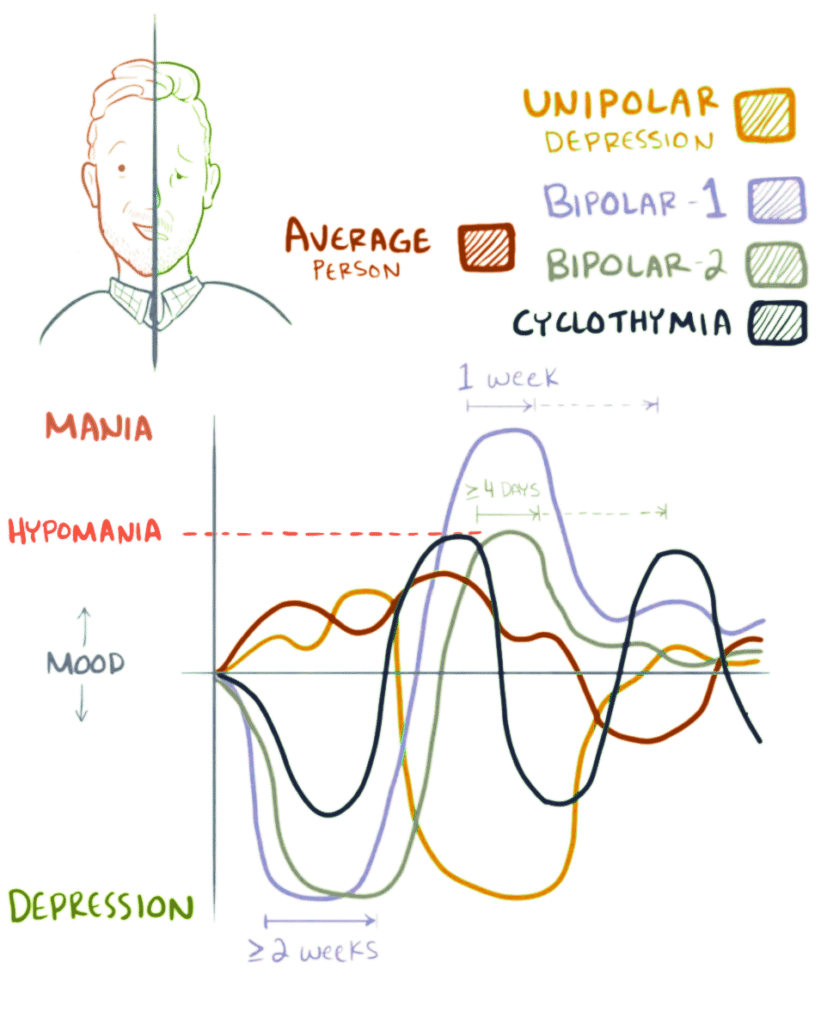Are you struggling with intense emotions, difficult relationships, or self-destructive behaviors? You’re not alone. Many people in Milwaukee are discovering the transformative power of Dialectical Behavior Therapy (DBT) to overcome these challenges and build a more fulfilling life.
DBT therapy offers evidence-based solutions and therapies for individuals dealing with borderline personality disorder, trauma, substance use issues, bipolar disorder, and various mental health conditions. With the right support and personalized approach, you can support individuals in developing the skills needed to regulate emotions, manage stress, and create healthier relationships.
This comprehensive guide will help you understand DBT therapy, its benefits, and how Dr. Matthew G. Mandelbaum’s unique approach to DBT therapy in Milwaukee can support your journey toward emotional resilience and personal growth.
What is Dialectical Behavior Therapy?
Dialectical Behavior Therapy (dialectical behavioral therapy) is an evidence-based treatment modality originally developed by Dr. Marsha Linehan in the 1980s. DBT combines cognitive behavioral therapy techniques with mindfulness practices and distress tolerance skills, integrating various treatment modalities to help individuals manage intense emotions and destructive behavior patterns.
The term “dialectical” refers to the integration of opposing concepts—acceptance and change. This approach teaches you to accept yourself while simultaneously working to create positive changes in your life. Unlike traditional cognitive behavioral therapy, DBT emphasizes the balance between validation and transformation.
Ready to Start Therapy?
Your healing journey can begin today. Fill out the form below to connect with a therapist who truly listens and understands.
A dialectical behavioral therapy program offers a comprehensive, structured approach to treatment, often tailored to individual needs and integrated with other evidence-based modalities.
Core Components of DBT
DBT therapy focuses on four essential skill modules:
- Mindfulness: Learning to stay present and aware of your thoughts, feelings, and surroundings without judgment. These mindfulness techniques help you observe your experiences without being overwhelmed by them.
- Distress Tolerance: Developing healthy coping skills to manage crisis situations without making them worse. This includes learning to tolerate difficult emotions and situations without resorting to harmful behaviors.
- Emotion Regulation: Understanding and managing your emotional responses more effectively. You’ll learn to identify triggers, reduce emotional vulnerability, and increase positive emotions.
- Interpersonal Effectiveness: Building skills to maintain healthy relationships while advocating for your needs. This includes learning to set boundaries, communicate effectively, and resolve conflicts constructively.

Photo by micheile henderson on Unsplash
Benefits of DBT for Mental Health
DBT therapy offers numerous benefits for individuals seeking support for various mental health issues. Research consistently shows that DBT can significantly improve quality of life and reduce symptoms across multiple conditions. In addition to mental and emotional well-being, ongoing participation in DBT can also contribute to better physical health as part of a holistic approach.
Emotional Regulation and Stability
One of the primary benefits of DBT is improved emotional regulation. Many clients experience intense mood swings, emotional dysregulation, mood instability, and overwhelming feelings that interfere with daily life. Through DBT skills training, you learn to identify emotional triggers, understand your emotional patterns, and develop healthy responses to challenging situations.
Dr. Mandelbaum has seen remarkable transformations in clients who previously struggled with emotional instability. One client shared how DBT techniques helped her manage panic attacks during high-stress work situations, allowing her to maintain her professional performance while addressing her mental health needs.
Reduced Self-Harm Behaviors
DBT has proven particularly effective in reducing self-harm behaviors and suicidal thoughts. The distress tolerance skills taught in DBT provide healthy alternatives to destructive coping mechanisms. Clients learn to navigate difficult emotions without resorting to harmful behaviors.
Improved Relationships
The interpersonal effectiveness component of DBT helps individuals build stronger, more satisfying relationships. You’ll learn to communicate your needs clearly, set healthy boundaries, and resolve conflicts constructively. These skills are valuable in both personal and professional relationships.
Enhanced Stress Management
DBT provides practical tools for managing stress and overwhelming situations. The combination of mindfulness and distress tolerance skills helps you stay grounded during challenging times and respond thoughtfully rather than reactively.

“Bipolar mood shifts” by Osmosis is licensed under CC BY-SA 4.0
Conditions Treated with DBT
DBT therapy has been extensively researched and proven effective for treating various mental health disorders and emotional challenges. A DBT program is a comprehensive, evidence-based treatment option that includes both group and individual therapy, focusing on emotional regulation, coping skills, and addressing specific mental health conditions.
Borderline Personality Disorder
DBT was originally developed to treat borderline personality disorder (BPD), and it remains the gold standard treatment for this condition.
Individuals with BPD often experience intense emotions, unstable relationships, and identity disturbances. DBT addresses these core symptoms through targeted skill development and therapeutic support.
Post-Traumatic Stress Disorder
DBT is highly effective for individuals with post-traumatic stress disorder (PTSD) and complex trauma. The therapy helps process traumatic experiences while building resilience and coping skills.
Dr. Mandelbaum’s trauma-informed approach ensures that treatment is sensitive to each client’s unique experiences.
Substance Use Disorders
Many individuals with substance use disorders benefit from DBT’s focus on distress tolerance and emotion regulation. The therapy helps address the underlying emotional issues that often contribute to substance use while providing healthy coping alternatives.
Depression and Anxiety
DBT skills are valuable for managing depression and anxiety symptoms. The mindfulness and emotion regulation components help individuals break free from negative thought patterns and develop more balanced perspectives.
Eating Disorders
DBT has shown effectiveness in treating various eating disorders by addressing the emotional dysregulation that often underlies disordered eating behaviors.
DBT Therapy in Milwaukee: Finding the Right Support
Milwaukee offers various mental health resources, but finding personalized, expert DBT therapy can be challenging. Dr. Matthew G. Mandelbaum brings over 20 years of experience and specialized training to provide exceptional DBT therapy in Milwaukee, Wisconsin.
DBT is available in a range of therapeutic settings, including group therapy, individual sessions, and telehealth support, to ensure comprehensive care for clients.
Comprehensive Assessment and Personalized Treatment
Dr. Mandelbaum begins each therapeutic relationship with a thorough assessment to understand your unique needs, challenges, and goals. This personalized approach ensures that your DBT therapy is tailored to address your specific circumstances and mental health concerns.
Individual Therapy Focus
While many DBT programs emphasize group settings, Dr. Mandelbaum provides individual therapy sessions that allow for deeper exploration of personal issues and customized skill development. This one-on-one approach enables more focused attention on your specific needs and faster progress toward your goals.
Trauma-Informed Care Integration
Dr. Mandelbaum’s unique approach combines DBT with trauma-informed care, recognizing that many individuals seeking DBT therapy have experienced trauma. This integration ensures that therapy is conducted in a safe space where you feel understood and supported throughout your healing journey.
Dr. Mandelbaum’s Unique Approach to DBT
Licensed Psychologist | Serving Clients in 43 States
Over 20 Years of Experience in Evidence-Based, Transformational Care
You’re not broken—and you’re not alone.
Dr. Mandelbaum specializes in helping highly sensitive, insightful individuals reconnect with their authentic selves and move from merely surviving to fully thriving. Whether you’re a professional in a demanding field, a university student navigating a pivotal transition, or someone who simply feels things deeply and intensely, you deserve support that meets you where you are—and challenges you to grow.
Through a deeply personalized and relational approach, he will integrate evidence-based practices, such as Dialectical Behavior Therapy (DBT), with trauma-informed care and mindfulness techniques. His role is to help you recognize your inner strengths, regulate your emotions with clarity, and create lasting meaningful change.
Approach
Grounded in science. Guided by compassion.
He offers therapy that is both affirming and empowering, designed to help you build emotional resilience, improve your relationships, and make values-aligned decisions. Clients often say that he “gets them” in ways others don’t—because he truly listens, reflects deeply, and tailors every session to your unique needs and goals.
Mission
To provide compassionate, collaborative therapy that fosters healing, insight, and forward movement. Dr. M is here to help you reconnect with who you truly are—and use that awareness to build a life that feels more grounded, authentic, and free.
Vision
To create a space where individuals can overcome emotional barriers, tap into their wisdom, and transform their struggles into strength. With the right tools and support, you can rewrite your story—and Dr. M is here to help you do just that.

Photo by Bret Kavanaugh on Unsplash
Telepsychology Sessions: Convenient Access to DBT
One of the significant advantages of working with Dr. Mandelbaum is the availability of telepsychology sessions. This option provides convenient access to high-quality DBT therapy without the need to travel to a physical office.
In addition, clients have access to a telehealth support line for immediate assistance, allowing them to receive guidance during a difficult situation outside of scheduled sessions.
Accessibility Across Multiple States
Dr. Mandelbaum provides telepsychology services across 43 states, making his expertise accessible to individuals throughout the country. This broad reach ensures that you can receive consistent, high-quality care regardless of your location.
Convenience and Flexibility
Telepsychology sessions offer flexibility for busy professionals and individuals with challenging schedules. You can receive therapy from the comfort of your home or office, eliminating travel time and reducing barriers to consistent treatment.
Maintaining Therapeutic Connection
Despite being conducted remotely, telepsychology sessions maintain the same therapeutic effectiveness as in-person sessions. Dr. Mandelbaum ensures that the therapeutic relationship remains strong and supportive through video sessions.
Success Stories: Real Results from DBT Therapy
The effectiveness of DBT therapy with Dr. Mandelbaum is evident in the success stories of his clients. These anonymized examples illustrate the transformative power of personalized DBT treatment.
Managing Panic Attacks in Professional Settings
Sarah, a marketing executive, came to Dr. Mandelbaum struggling with severe panic attacks during important work presentations.
Through DBT skills training, she learned mindfulness techniques to stay grounded and distress tolerance skills to manage anxiety symptoms. After several months of therapy, Sarah successfully managed her panic attacks and received a promotion at work.
Overcoming Self-Harm Behaviors
James, a college student, had been engaging in self-harm behaviors as a way to cope with emotional pain. Dr. Mandelbaum worked with him to develop healthier coping strategies using DBT distress tolerance skills.
James learned to identify his triggers and use alternative coping mechanisms. He has now been free from self-harm behaviors for over a year.
Improving Emotional Regulation in Relationships
Maria struggled with intense emotional reactions that were damaging her relationships with family and friends. Through DBT emotion regulation skills, she learned to identify her emotional triggers and respond more thoughtfully. Her relationships have significantly improved, and she reports feeling more confident in social situations.
Building Resilience After Trauma
David sought therapy after experiencing workplace trauma that left him feeling anxious and disconnected. Dr. Mandelbaum’s trauma-informed DBT approach helped him process his experiences while building resilience. David now feels more empowered and has returned to work with renewed confidence.
Common Questions About DBT Therapy
How much does DBT therapy cost?
DBT therapy costs vary depending on the provider and location. Dr. Mandelbaum offers premium private-pay services, and many health insurance plans provide 50-80% reimbursement for out-of-network therapy sessions. Documentation for insurance reimbursement is provided upon request.
Is DBT therapy covered by insurance?
While Dr. Mandelbaum’s practice operates as a private-pay service, many insurance plans offer reimbursement for out-of-network providers. Most insurances provide coverage for DBT therapy services. It’s recommended to check with your insurance provider about coverage options and reimbursement rates.
What is the 24-hour rule in DBT?
The 24-hour rule in DBT refers to a distress tolerance skill that encourages individuals to wait 24 hours before acting on intense emotions or urges. This cooling-off period allows emotions to naturally decrease in intensity and provides time to use DBT skills to respond more effectively.
How much are DBT sessions?
DBT session costs vary based on the provider and treatment format. Dr. Mandelbaum’s individual sessions are priced as premium services, reflecting his extensive experience and personalized approach. Contact his office for current pricing information.
What’s the difference between DBT and CBT?
While both are evidence-based treatments, DBT differs from traditional cognitive behavioral therapy (CBT) in several key ways. DBT emphasizes acceptance alongside change, incorporates mindfulness practices, and focuses more heavily on emotion regulation and interpersonal skills. CBT primarily focuses on changing thought patterns and behaviors.
Insurance and Payment Options
Understanding your payment options is important when seeking DBT therapy. Dr. Mandelbaum’s practice accepts various forms of payment and works with clients to make treatment accessible.
Private Pay Services
Dr. Mandelbaum offers private pay services, which allows for greater flexibility in treatment planning and eliminates restrictions often imposed by insurance networks. This approach ensures that therapy can be tailored to your specific needs without external limitations.
Insurance Reimbursement
Many insurance plans, including United Health Care, WEA Trust, and Forest County Potawatomi, offer reimbursement for out-of-network therapy services. Dr. Mandelbaum’s office provides the necessary documentation to help you obtain maximum reimbursement from your insurance provider.
Flexible Payment Options
Understanding that mental health treatment is an investment, Dr. Mandelbaum’s practice offers flexible payment options to make therapy accessible to those who need it.

Taking the Next Step: Your Journey to Emotional Wellness
If you’re ready to begin your journey toward emotional wellness and personal growth, taking the first step is crucial. Dr. Mandelbaum’s approach to DBT therapy in Milwaukee offers the personalized support and evidence-based treatment you need to create lasting positive changes.
Free Consultation
Dr. Mandelbaum offers free consultations to help you determine if DBT therapy is right for you. During this initial conversation, you can discuss your concerns, ask questions about treatment, and learn more about his approach.
Scheduling Your First Session
Ready to begin? Scheduling your first session is simple. You can contact Dr. Mandelbaum’s office directly at (212) 933-0758 or fill out the contact form on his website. His team will work with you to find convenient appointment times that fit your schedule.
What to Expect From Our Dialectical Behavioral Therapy Program
Your first session will focus on understanding your unique situation, discussing your goals, and developing a personalized treatment plan. Dr. Mandelbaum will explain how DBT skills can address your specific challenges and outline the path forward.
Building Your Foundation for Lasting Change
DBT therapy offers proven strategies for managing emotions, improving relationships, and building resilience. With Dr. Mandelbaum’s expert guidance and personalized approach, you can develop the skills needed to navigate life’s challenges with confidence and create the fulfilling life you deserve.
Your journey toward emotional wellness begins with a single step. Whether you’re struggling with intense emotions, difficult relationships, or self-destructive behaviors, DBT therapy can provide the tools and support you need to transform your life.
Don’t wait to invest in your mental health and well-being. Contact Dr. Mandelbaum today to schedule your free consultation and discover how DBT therapy in Milwaukee can help you build a brighter, more resilient future.
Remember, seeking help is a sign of strength, not weakness. You deserve support, compassion, and effective treatment. Take the first step toward emotional wellness and personal growth by reaching out today.
Learn More About DBT Therapy in Milwaukee
If you or someone you love is considering Dialectical Behavior Therapy (DBT) in Milwaukee, there are excellent local and virtual resources available. Below is a curated list of trusted therapy centers, group programs, and educational content to help you explore your options and make an informed decision.
DBT Skills Groups (In-Person & Virtual)
- Milwaukee County DBT Skills Groups – Psychology Today | Weekly in-person and online DBT groups available, including those hosted by Tosa Psych and other clinics.
- DBT Group – Shoreside Therapies | A structured DBT group offering support for anxiety, depression, and emotional regulation.
- DBT-Informed Group Therapy – LifeStance Health | Group sessions focused on mindfulness, distress tolerance, and emotion regulation, led by licensed counselors.
Statewide & Regional DBT Clinics (In Person)
- Iris Health Clinic – Milwaukee & Waukesha | Offers DBT through individual and group sessions, both in-person and via telehealth.
- American Behavioral Clinics – DBT Services | A comprehensive behavioral health center offering DBT as part of their mental health services.
- WisHope Recovery Center – Waukesha | Provides DBT for teens and adults in both residential and outpatient treatment programs.
- Red Oak Counseling – Milwaukee Office | Offers DBT therapy and psychiatric support at their Milwaukee location.
- Shorehaven Behavioral Health – DBT Program | Offers a complete DBT program with weekly group sessions, individual therapy, and crisis coaching.
Learn More About DBT
- Dialectical Behavior Therapy – Wikipedia
A comprehensive overview of DBT, including its origin, structure, four key modules, and evidence base.
Whether you’re looking for in-person support or virtual DBT groups in Milwaukee, there are high-quality options available. Take the time to explore what feels like the right fit—and remember, healing is possible with the right support.



